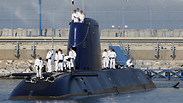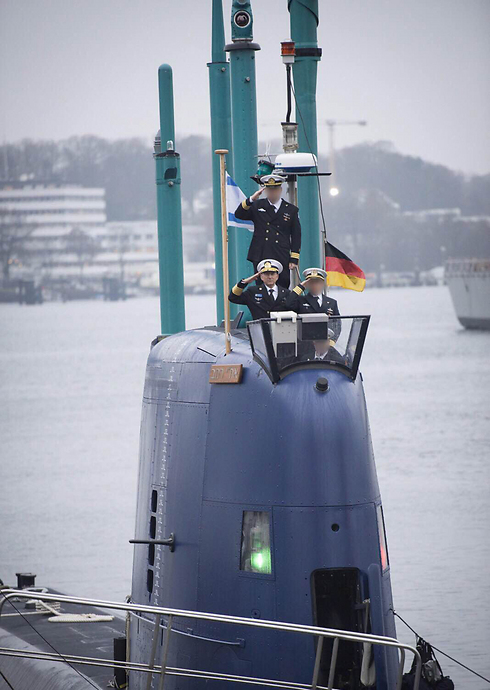
The INS Rahav submarine received from Germany
צילום: רויטרס
Defense Ministry’s glorious zigzagging
Analysis: A senior security source says that despite the ministry’s initial claim, all relevant officials in the defense establishment were aware of the Iranian involvement in the German conglomerate which sells submarines and warships to Israel.
What is happening at the Defense Ministry?

Several days after ministry officials said they were unaware of any Iranian involvement in the German ThyssenKrupp conglomerate, which sells submarines and warships to Israel, they admitted on Tuesday that they had already known in 2004 that an Iranian corporation held about 5 percent of the company’s shares. It happened hours after Defense Minister Avigdor Lieberman told the Knesset’s Finance Committee, for the first time, that “the issue was known.”
It was a glorious case of zigzagging. On Thursday evening, we approached the Defense Ministry with the details we had exposed about the involvement of the Iranian regime’s foreign investment company in the German conglomerate. We added links to the available information on the Web, but Defense Ministry officials insisted on a formal response that “we are unaware of any Iranian ownership in the ThyssenKrupp company.”

The INS Rahav submarine. ‘We worked with the Germans so that the secrets would be kept,’ says senior security source (Photo: IDF Spokesperson’s Office) (צילום: דובר צה"ל)
On Friday, we reported in Yedioth Ahronoth that a chunk of the Israeli money from the submarine deal made its way into Iranian hands through ThyssenKrupp, which produces the submarines sold to the Navy, as well as the Sa'ar 6-class corvettes. Part of ThyssenKrupp’s shares are held by the Iran Foreign Investment Company (IFIC), a government-owned company and the main channel for the investment of Iranian government funds around the world, mainly through two subsidiaries. The Iranian involvement raised alarming questions regarding a possible exposure of the Iranian shareholders to one of the IDF’s most classified projects.
On Friday, after the report was published, we approached the Defense Ministry again and received the same answer. This repeated itself on Saturday evening and on Sunday. By then, however, we already reported that information about the Iranian connection had been delivered to the defense establishment more than a decade ago. Only on Monday morning, after being asked about it, Lieberman said: “The issue was known. Many things were decided long before I arrived at the Defense Ministry. In any event, it has no impact. There was no other alternative.”
Following his comments, the ministry’s response changed as well: “A thorough examination conducted in the Defense Ministry over the past few days with the officials in charge of the matter in the ministry revealed that they had known since 2004 that IFIC held 4.5 percent in the German ThyssenKrupp at the time, and the required security cover was provided accordingly.”
Sources in the Defense Ministry explained that they had discovered the details only during an examination which ended on Monday, and that upon realizing their mistake they changed the response.
But a senior security source who was involved in the matter in the previous decade told Yedioth Ahronoth on Monday that he was amazed by the ministry’s statement on Friday. “The Director of Security of the Defense Establishment knew about the Iranian involvement, as did all the relevant officials in the defense establishment. We worked with the Germans so that the secrets would be kept and that we would know how to supervise them as well,” the source said.
“Israel didn’t really have many alternatives apart from the Germans,” he added. “It was the best product, they gave us a discount, and there was a concern that if we bought from a different European country, like Britain or France, they might impose sanctions on us for diplomatic reasons and the project would be stopped.”
He admitted that they knew there was a problem trading with Iran, especially because of the money Iran would make out of the deal in an era in which Israel fights to thwart such trade ties, but added that “it was the least worst option.”










